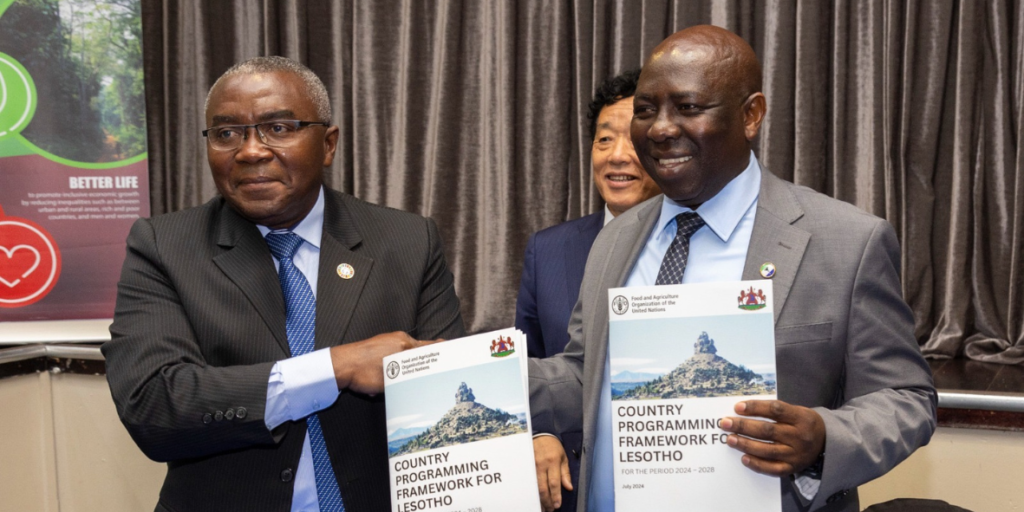Libuseng Molato
The government of Lesotho has signed a new Country Programming Framework (CPF) with the Food and Agriculture Organization (FAO).
This strategic agreement addresses the country’s food challenges and bolsters efforts to transform its agricultural sector.
Signed on the 5 August at Avani Maseru, during the visit of United Nations (UN) agricultural agencies’ delegations, the agreement directly responds to His Majesty’s call for collaboration in revolutionising food production in Lesotho.
The CPF outlines key priorities that FAO, in collaboration with various Lesotho ministries, will support and implement to enhance food production and security in the country.
Speaking on behalf of the government, Minister of Agriculture, Food Security and Nutrition Thabo Mofosi, expressed his commitment to the initiative.
“I am privileged to have the opportunity to receive this important project from FAO. I commit my ministry to ensuring its successful implementation, changing the lives of Basotho for the better,” Mofosi stated.
FAO Director-General Dr. Qu, emphasised the importance of strong partnerships in achieving Sustainable Development Goals (SDGs).
He highlighted the critical role of collaboration in transforming global agrifood systems to become more efficient, inclusive, resilient, and sustainable.
“During my discussions with you over the past days I have listened and appreciated the work your ministries are doing with FAO. More importantly, I see great potential in strengthening our collaboration to achieve even more impactful results,” Dr. Qu noted.
He also discussed the challenges and opportunities facing Lesotho, particularly the need to shorten agrifood value chains to make them more resilient to shocks.
FAO has committed to working with Lesotho to tap into funding opportunities through the Global Environment Facility and the Green Climate Fund.
“Sustainability is the goal; we need to produce more with less,” Dr. Qu added.
The CPF encompasses three key Technical Cooperation Projects (TCPs) funded by FAO:
- FAO Digital Villages Initiative: This project leverages digital technologies to improve agricultural practices, enhance market access, and boost rural development in Lesotho.
- FAO Green Cities Initiative: Aimed at promoting urban agriculture and sustainable urban planning, this initiative seeks to create greener, more livable cities while addressing food security.
- Aquaculture Development: This project focuses on enhancing the aquaculture value chain, improving food security, and creating job opportunities in Lesotho.
“No one entity can address these challenges alone, but together we can do more and better. As the saying goes, ‘One is too small a number to achieve greatness.’ We need to join hands and work together to support Lesotho in achieving prosperity for all,” Dr. Qu said, stressing the need for collective action.
The signing ceremony brought together various ministries and partners committed to supporting Lesotho’s agricultural transformation.
Minister of Natural Resources, Mohlomi Moleko, highlighted the importance of resources in agriculture, noting that all SDGs are water-dependent.
“The Lesotho Highlands Water Project, which includes building dams and tunnels for water provision to South Africa, must ensure that these dams are multipurpose, providing potable water, supporting tourism, fisheries, and irrigation systems,” Moleko stated.
Minister of Environment and Forestry, Letsema Adontsi for his part, expressed his ministry’s commitment to environmental conservation.
“As we work to provide shelter for the nation, we must ensure trees are planted across the country for oxygen and land protection. We are honoured to receive FAO’s support in this mission,” Adonts’i remarked.
Lebona Lephema, Minister of Local Government, Chieftainship, Home Affairs, and Police, underscored the importance of collaboration citing he recently visited South Africa with the Prime Minister and Minister Mofosi to explore feedlot opportunities.
“As you all know, we import nearly everything and want to change that by producing for ourselves. With FAO’s help, we believe we can solve our food security problems,” Lephema said.
European Union Ambassador Paola Amadei echoed the importance of preserving resources and improving rural livelihoods.
“Without conserving resources and supporting the well-being of rural populations, the overall population will not thrive. Thank you, Dr. Qu, for highlighting the four key factors: better agriculture, better nutrition, better environment, and better life. These are the driving forces behind our strategic framework,” Amadei said.
Under the second compact of the Millennium Challenge Corporation (MCC) an investment of $118 million in horticulture irrigation development has been set aside
MCC has collaborated with FAO to finalise Lesotho’s irrigation policy.
The newly signed CPF provides seed money and catalytic funding for its implementation.
Over the next five years, FAO will focus on enhancing agricultural production and productivity, promoting sustainable management of natural resources, and building climate resilience in Lesotho. Through this partnership, Lesotho is poised to make significant strides towards achieving food security and sustainability.

Your Trusted Source for News and Insights in Lesotho!
At Newsday Media, we are passionate about delivering accurate, timely, and engaging news and multimedia content to our diverse audience. Founded with the vision of revolutionizing the media landscape in Lesotho, we have grown into a leading hybrid media company that blends traditional journalism with innovative digital platforms.










